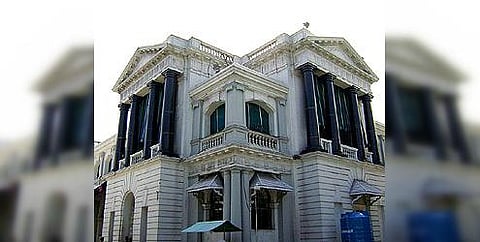

CHENNAI: The DMK government led by Chief Minister MK Stalin is making arrangements to celebrate the centenary year of the elected legislature in Tamil Nadu in a grand manner. The history of the elected legislature in Tamil Nadu began with a bang from the Justice Party rule during the British regime since it enacted many landmark legislations as well as social reform measures, and since then, the legislative body here has undergone many changes.
The DMK takes pride in celebrating its roots, and now, the centenary of the Madras Legislative Council is yet another occasion for that since the history of this legislative body began with the rule of the Justice Party that later blossomed into the Dravidian movement.
Asked about the need to celebrate the centenary of the Madras Legislative Council now since the diamond jubilee of the State Assembly from the year of Independence was celebrated in 2012, DMK spokesperson J Constantine Ravindran told The New Indian Express that when the Madras Legislative Council was set up in 1921, for the first time, legislative powers were given to the provincial legislative body to enact laws for "peace and good government" in the Province.
So, in other words, the people's government was established in 1921, starting with the Justice Party's rule. "What is significant is that the then Madras Province had much more powers than the present setup. Above all, the Justice Party regime rolled out many path-breaking social reforms. So, we take pride in celebrating the centenary of that important milestone in Tamil Nadu's history," Ravindran reasoned.
Asked whether there was any political motive behind this celebration, Ravindran denied it stoutly, saying, "When the DMK formed the government for the first time in 1967, the then Chief Minister Arignar Anna said his government is the continuation of the Justice Party government formed in 1921.
Now, Chief Minister MK Stalin has reiterated this point in the State Assembly. So, this celebration is an occasion for renewing the rights of the State and an important milestone for the Dravidian movement. There is no need for a political motive."
Political analyst Tharasu Shyam is of the view that the centenary celebrations would not be complete without inviting the Chief Ministers of Andhra Pradesh, Karnataka, Kerala and Odisha since parts of these States were part of the Province of Madras during the British Regime. If that happens, the event could turn out to be a show of strength for Chief Minister MK Stalin and may add to his growing stature as a national leader.
Shyam also said the President would think twice before okaying the invitation of Stalin as the BJP might hinder the President from attending these celebrations for many reasons, including that the occasion celebrates the legislative council, which was formed during the British era, and moreover, the glories of the Justice Party would be sung on the occasion.
The first elected legislature in the State, originally called the Madras Legislative Council, was established in 1921 under the Government of India Act, 1919. The term of the Council was three years. It consisted of 132 members, of which 34 were nominated by the Governor and the rest were elected. The Council met for the first time on January 9, 1921 at Fort St George, and was later formally inaugurated by the Duke of Connaught, a paternal uncle of the King of England, on January 12, 1921 on the request of the Governor, Lord Wellington.
Under the Government of India Act, 1919, the first general election to the Madras Legislative Council was held in December, 1920. The Congress party did not participate in the election due to its non-cooperation movement, and the Justice Party registered a tremendous victory, capturing 63 out of 98 seats.
Even in the second general elections to the Council, held in 1923, the Justice Party formed the ministry. But the party lost the 1926 elections. In the 1930 general election, the Justice Party won again and formed the ministry. But the Congress party defeated the Justice Party in the 1937 elections.
The Dravidian parties' legacy of social justice owes its continuation till now to the social reforms initiated by the Justice Party during its rule in the State. On September 16, 1921, the Government of Madras issued the Communal G.O. extending the principle of distribution of appointments among various castes and communities.
Enactment of Hindu Religious Endowment Act in 1926, abolition of the Devadasi system, the introduction of issuing free pattas to the poor for housing sites, and the introduction of the mid-day meal scheme in Chennai were among the important social justice measures of the Justice Party.
The Government of India Act, 1935 established a bicameral legislature in the Province of Madras. The Legislature consisted of the Governor and two Chambers, called the Legislative Council and the Legislative Assembly.
The Legislative Assembly consisted of 215 members, of which 146 were elected from general seats, of which 30 were reserved for Scheduled Castes, Tribes, Muslims, Anglo-Indians, Europeans, Indian Christians, and others. Eight seats were reserved for women.
The first Legislature of the erstwhile Madras State under the Constitution of India was constituted on March 1, 1952, after the first General elections held in January 1952 on the basis of adult suffrage. After the DMK came to power, the name of Madras State was changed to Tamil Nadu and the Assembly here became the Tamil Nadu Legislative Assembly.
In 1986, the State Assembly became unicameral following the abolition of the legislative council. Very soon, the Tamil Nadu Assembly would become bicameral again since the DMK had promised to restore the Legislative Council.